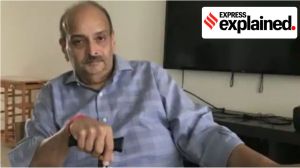Ritu Sarin is Executive Editor (News and Investigations) at The Indian Express group. Her areas of specialisation include internal security, money laundering and corruption. Sarin is one of India’s most renowned reporters and has a career in journalism of over four decades. She is a member of the International Consortium of Investigative Journalists (ICIJ) since 1999 and since early 2023, a member of its Board of Directors. She has also been a founder member of the ICIJ Network Committee (INC). She has, to begin with, alone, and later led teams which have worked on ICIJ’s Offshore Leaks, Swiss Leaks, the Pulitzer Prize winning Panama Papers, Paradise Papers, Implant Files, Fincen Files, Pandora Papers, the Uber Files and Deforestation Inc. She has conducted investigative journalism workshops and addressed investigative journalism conferences with a specialisation on collaborative journalism in several countries. ... Read More
Taj: Let off by UPA, Maya gets CVC call
In what is an embarrassment to the UPA Government, the Central Vigilance Commission (CVC) today told the Supreme Court that there was ‘...

In what is an embarrassment to the UPA Government, the Central Vigilance Commission (CVC) today told the Supreme Court that there was ‘‘good’’ evidence to prosecute former Uttar Pradesh Chief Minister Mayawati in the Rs 175-crore Taj corridor case.
This comes as a shot in the arm for the CBI which had, as first reported in The Indian Express, filed a closure report in the case after a written opinion by Attorney General Milon Banerjee that the case wasn’t fit for prosecution.
However, the CVC concurred with the CBI in closing cases against former Chief Secretary of Uttar Pradesh D S Bagga; then Principal Secretary to Chief Minister P L Punia; former Union Environment Secretary K C Mishra, former State Environment Secretary V K Gupta and S C Bali, MD of the National Project Construction Corporation.
The FIR in the case was filed against Mayawati and seven others by the Central Bureau of Investigation (CBI) in October 2003.
The apex court, had in an unprecedented move, asked for the CVC’s opinion over and above that of the AG’s. Significantly, the CVC had not asked for the AG’s opinion and had examined the CBI’s case file in isolation of it.
Official sources reveal that while deciding there was no ‘‘mens rea’’ (criminal intention) and no loss to the national exchequer in the Taj corridor case, the Attorney General had, instead, of relying on the opinion of the CBI’s key investigating officers, relied upon the opinion of the Deputy Legal Advisor of the Law Ministry, O P Verma.
The DLA’s opinion is cited at least in two places in the AG’s final opinion. This is, for instance, what the AG’s detailed opinion contained:
• ‘‘I agree with the DLA that the proper course of action would be to take disciplinary action against the officers for their omissions and misconduct.’’
• ‘‘I agree with the DLA that if the Cabinet Committee on Economic Affairs (CCEA) clearance was not obtained, it was an omission on part of the officers and would not amount to criminal misconduct.’’
It is understood that on its part, the CBI had sought a final opinion from the AG in view of the difference of opinion of some of its own officers. CBI’s Director of Prosecution S K Sharma, for instance, had also opined that this was a case of initiating only departmental action against the errant Uttar Pradesh officers.
In his own final notings on the Taj Corridor file, CBI Director U S Mishra, while making a point-by-point rebuttal of the AG’s opinion had stated this, ‘‘Under the circumstances and in view of the categorical legal opinion of the Attorney General, the case may not be fit for prosecution.’’



- 01
- 02
- 03
- 04
- 05





























